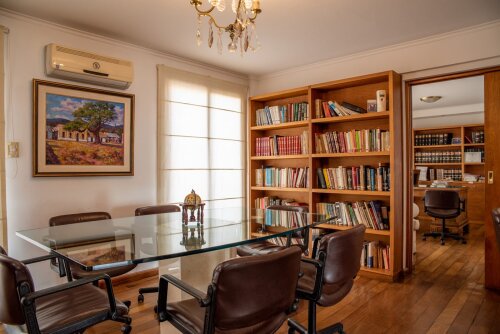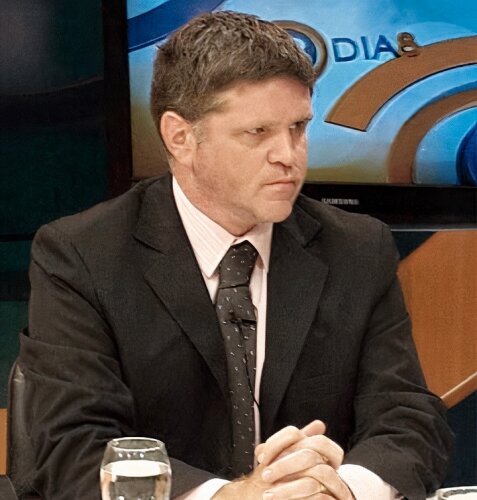Best White Collar Crime Lawyers in Córdoba
Share your needs with us, get contacted by law firms.
Free. Takes 2 min.
List of the best lawyers in Córdoba, Argentina
About White Collar Crime Law in Córdoba, Argentina
White collar crime generally refers to non-violent offenses committed for financial gain. In Córdoba, Argentina, these cases commonly involve fraud, embezzlement, insider trading, tax evasion, money laundering, bribery, corruption, and other economic or administrative offenses. Investigations and prosecutions can be handled by provincial authorities when the conduct is local, and by federal authorities when the conduct affects federal interests, crosses provincial or national borders, involves international financial flows, or triggers national laws such as money-laundering regulations.
Because white collar matters are often document- and records-based, investigations frequently rely on financial audits, subpoenas, asset freezes, and cooperation between financial intelligence units, tax authorities, prosecutors and banks. Outcomes can include criminal penalties, civil liability, administrative sanctions, asset forfeiture and reputational damage.
Why You May Need a Lawyer
You may need a lawyer if you are under investigation, have been formally accused, or are otherwise involved in conduct that could give rise to criminal or administrative liability. Common situations include:
- Receiving a summons, complaint, or notice from a prosecutor or police authority.
- Being subject to searches, seizures or asset freezes related to suspected financial crimes.
- Facing tax audits that escalate into criminal tax or customs investigations by AFIP or provincial tax authorities.
- Being a director, manager or employee of a company under inquiry for fraud, bribery or accounting irregularities.
- Having transactions flagged by the financial intelligence unit - Unidad de Información Financiera (UIF) - for possible money laundering.
- Confronted with media exposure, administrative investigations or risks to professional licenses and corporate contracts.
Lawyers specialized in white collar defense provide immediate protection of rights, manage communications with authorities, advise on document preservation and disclosure, coordinate forensic accountants, and develop legal strategies to minimize criminal, civil and administrative consequences.
Local Laws Overview
Key legal elements relevant to white collar crime in Córdoba include both national laws and provincial processes. Important points to understand:
- Penal framework - Argentina's Penal Code sets out criminal offenses like fraud, embezzlement, bribery, and other economic crimes. The specific qualification of conduct depends on facts, intent and applicable articles of the Penal Code.
- Money laundering laws - Argentina has specific anti-money-laundering legislation that criminalizes laundering proceeds from a wide range of predicate offenses. The Unidad de Información Financiera - UIF - acts as the national financial intelligence unit and coordinates reporting and investigations.
- Tax and customs offenses - Fiscal crimes are governed by tax laws and can lead to criminal investigations by the Administración Federal de Ingresos Públicos - AFIP - or provincial tax authorities. Tax litigation can produce parallel criminal exposure.
- Administrative and anti-corruption rules - Public-sector offenses, including malversation of public funds, bribery and other corruption crimes, are prosecuted under criminal rules and can involve specific administrative sanctions and disqualification from public office.
- Jurisdiction - Federal authorities typically handle crimes with cross-border elements, international financial flows or those explicitly covered by federal statutes. Provincial courts and prosecutors of Córdoba handle crimes wholly within provincial competence. Cooperation between levels of government is common.
- Procedural protections - Argentine criminal procedure provides rights such as presumption of innocence, right to defense and technical assistance, and the right to request judicial review of detention and seizures. Preventive detention - prisión preventiva - and asset measures are tools prosecutors may seek, subject to judicial approval.
- Evidence and enforcement tools - Investigators may use search warrants, seizure of documents, interception of communications with court orders, asset freezes and requests for international judicial cooperation. Forensic accounting and expert reports play a central role in proof.
- Statute of limitations - Prescription periods vary according to the offense and its severity. Time limits can be interrupted by investigative acts or formal charges, altering deadlines for prosecution.
Frequently Asked Questions
What counts as a white collar crime in Córdoba?
White collar crimes are typically non-violent offenses committed for financial or commercial gain. Examples include fraud, embezzlement, bribery, corruption, accounting manipulation, insider trading, tax evasion and money laundering. Whether a specific act qualifies depends on the facts and the statutory elements in Argentine law.
Who investigates white collar crimes in Córdoba?
Investigations may be led by provincial prosecutors and police when the conduct is local. Federal prosecutors and specialized units intervene when the matter implicates federal laws, international or cross-border activity, or serious money-laundering or corruption claims. The Unidad de Información Financiera - UIF - and AFIP play key roles in financial and tax-related cases.
Can I be detained pending trial?
Yes. Argentine law allows for preventive detention - prisión preventiva - in certain circumstances, especially when there is risk of flight, danger to the investigation, or potential harm to victims. A judge must order detention based on prosecution requests and judicial assessment of the facts and legal criteria.
What penalties could I face if convicted?
Penalties vary widely by offense. They can include custodial sentences, fines, disqualification from public office, restitution, civil liability and asset forfeiture. Money-laundering and major corruption cases often carry severe penalties and long prison terms depending on sentence ranges in the Penal Code and applicable statutes.
Will my company also be liable?
Companies can face administrative sanctions, fines, civil damages and, in some cases, criminal liability under specific regimes. Even where corporate criminal liability is limited, companies frequently incur civil claims, regulatory penalties and reputational harm. Directors and managers may be individually prosecuted if personal conduct meets criminal elements.
What should I do if authorities come to my office or home?
Do not obstruct lawful actions, but protect your rights. Ask to see court orders, remain calm, and avoid giving statements without a lawyer present. Preserve documents and electronic records; do not attempt to destroy or hide evidence. Contact an attorney immediately and inform them of the searches or seizures.
Can I negotiate with prosecutors or seek a cooperation agreement?
Yes, Argentina provides mechanisms for negotiated resolutions, plea agreements and, in some cases, cooperation arrangements that can mitigate penalties. Availability depends on the facts, the prosecutor's policy, and the legal framework in force. A specialized lawyer will evaluate whether negotiation or cooperation is appropriate and guide discussions.
Will financial accounts be frozen or assets seized?
Yes. Prosecutors or judges can order preventive measures such as asset freezes, seizure of accounts, and provisional measures to preserve property related to alleged crimes. These measures are typically subject to judicial approval and can be challenged by defense counsel.
How long do investigations and trials usually take?
Timelines vary significantly. Investigations may take months or years depending on complexity, volume of evidence and interagency cooperation. Criminal trials can also be lengthy. Statute of limitations and procedural stages influence timing. Early legal intervention can sometimes accelerate resolution or reduce risk of escalation.
How do I choose the right lawyer in Córdoba?
Look for lawyers with demonstrable experience in criminal defense for economic and financial crimes, knowledge of local and federal procedure, familiarity with forensic accounting and a track record of handling complex investigations. Ask about their courtroom experience, strategy for investigations, fee structure and ability to coordinate with experts. Verify professional standing with the Colegio de Abogados local registry.
Additional Resources
Useful institutions and bodies to be aware of in Argentina and in Córdoba include:
- Ministerio Público Fiscal de la Provincia de Córdoba - provincial prosecutors office that handles criminal investigations within Córdoba.
- Poder Judicial de la Provincia de Córdoba - provincial courts that hear criminal cases at the provincial level.
- Unidad de Información Financiera - UIF - Argentina's financial intelligence unit that receives suspicious transaction reports and coordinates anti-money-laundering activity.
- Procuraduría de Criminalidad Económica y Lavado de Activos - PROCELAC - a federal office specialized in economic crime and money laundering investigations.
- Administración Federal de Ingresos Públicos - AFIP - responsible for tax investigations and potential criminal tax proceedings.
- Oficina Anticorrupción - national body involved in prevention and investigation of public corruption issues in certain contexts.
- Banco Central de la República Argentina - BCRA - for matters involving banking regulation and compliance.
- Colegio Público de Abogados de la Provincia de Córdoba - for referrals, professional verification and ethical complaints.
- Forensic accountants and certified auditors with experience in litigation support and financial investigations can be essential partners for defense or compliance work.
Next Steps
If you are facing a possible white collar investigation or suspect exposure to legal risk, consider these steps:
- Act promptly - early legal counsel helps protect rights, preserve evidence and shape strategy.
- Contact a specialized criminal defense lawyer in Córdoba - ask about experience with economic crimes, court practice and use of experts.
- Preserve documents and electronic records - avoid deleting or altering information and keep an inventory of relevant materials.
- Do not speak to investigators or prosecutors without your attorney - exercise your right to counsel and avoid self-incrimination.
- Gather key information - dates, contracts, communications, accounting records and notices received from authorities.
- Consider parallel civil or administrative exposure and coordinate defense across fronts - criminal, tax and regulatory issues often overlap.
- Ask about fees and engagement terms - obtain a written agreement that outlines scope, responsibilities and billing.
- If you represent a company, include corporate counsel and compliance officers early to manage internal inquiries, privilege issues and potential remedial steps.
White collar investigations can be complex and stressful. A focused legal team, timely action and careful management of documents and communications will improve your ability to respond and protect your rights in Córdoba, Argentina.
Lawzana helps you find the best lawyers and law firms in Córdoba through a curated and pre-screened list of qualified legal professionals. Our platform offers rankings and detailed profiles of attorneys and law firms, allowing you to compare based on practice areas, including White Collar Crime, experience, and client feedback.
Each profile includes a description of the firm's areas of practice, client reviews, team members and partners, year of establishment, spoken languages, office locations, contact information, social media presence, and any published articles or resources. Most firms on our platform speak English and are experienced in both local and international legal matters.
Get a quote from top-rated law firms in Córdoba, Argentina — quickly, securely, and without unnecessary hassle.
Disclaimer:
The information provided on this page is for general informational purposes only and does not constitute legal advice. While we strive to ensure the accuracy and relevance of the content, legal information may change over time, and interpretations of the law can vary. You should always consult with a qualified legal professional for advice specific to your situation.
We disclaim all liability for actions taken or not taken based on the content of this page. If you believe any information is incorrect or outdated, please contact us, and we will review and update it where appropriate.










